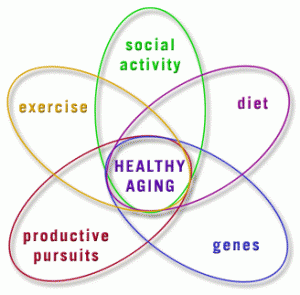A common misbelief is that “Ageing is meant to strip us of our abilities”. But what if, in contradiction to the phrase, ageing can be lived through in a healthy way? The answer being true, let us celebrate our age by making efforts towards successful ageing.
A novel way of looking at ageing is based on the fact that there are several factors which can make it graceful. This perspective is not about increasing the number of years you live or about mortality, but living the years disease-free, productively and zestfully. To stave off disease, it is required to modify our lifestyle to develop capabilities that enable us to do what we value.
The active, healthy lifestyle affects us at the genetic level and strengthens our ‘telomeres’. At a cellular level, telomeres are the protective caps at the end of each chromosome just like a shoelace – to keep it from fraying. However, through our lifespan some telomere ends get worn down and shortened. Research has deciphered that reduction of telomere length denotes signs of ageing (e.g.: wrinkling of skin, hair turning grey). Simply put, the longer the telomere length, the better off we are.
A geneticist, Elizabeth Blackburn and a health psychologist, Elissa Epel, explain in their book – The Telomere Effect how the entire process unfolds. They provide an incredibly hopeful message of healthy ageing by following the science of lengthening our telomeres.
An enzyme was discovered that could replenish and make longer telomeres, called telomerase. But bigger is not always better. Genetic studies provide information that more telomerase and telomere length will lower the risks for cardiovascular diseases, Alzheimer’s disease and other diseases of aging but it also makes the cell prone to cancer causing greater risk for certain types of cancers (brain cancers, melanoma and lung cancers). Thus, researchers have been striving to come up with protective and risk free factors to protect our telomere length.
However, the question is, can shortening of telomeres be prevented?
Learn the following strategies to make neuroprotective lifestyle changes and create a positive impact on ageing at the cellular level.
1. “It is not stress that makes us vulnerable, but the reaction to it”
Our predominant way of reacting to a stressful situation, overtime, paves its way to the cells and grinds down to our telomeres. Taking up the situation as a challenge, feeling confident about a positive outcome shields the telomeres from the worst effects. However, responding to it by feeling threatened will lead to opposite reactions. The takeaway is: “Make an effort to be stress resilient and improve your health”.
2. “Relationships Matter. Get Some!”
The experience of being valued, cared about and loved by others acts as a buffer against life stressors and promotes wellness in the elderly. A positive perception of social support mayact as a predictor for lesser risk to telomeres and to psychological problems. A quest for maintaining and celebrating relationships should be present from both sides which is applicable to families, friends, relatives and all the acquaintances you meet in your day to day life.
3. “Find a reason to get up in the morning”
This idea emphasizes on our ability to look forward, which could be gained by having a meaning and purpose in life. When we are young, growing a family and climbing the career ladder, our purpose in life is very clear. But after achieving those, it doesn’t mean that we live without a goal in mind. Be introspective about your passions, abilities and vocations, which will drive you every day to get up in the morning.
4. “Sleep is the golden chain that ties health and bodies together’’
What we commonly know about sleep is that any adult requires 7-8 hours of sleep. It is not thehours that matter but also the quality. If we experience both poor sleep quality or shorter sleep durations, it increases the risk to our telomeres. It is essential to understand the sleep cycle, disturbances experienced and take immediate steps for maintaining sleep hygiene.
5. “Maintain your brain”
Some cognitive decline is a normal part of ageing. Studies have shown that a lifestyle that includes cognitive stimulation through active learning slows cognitive decline. Never stop learning and challenging your mind! Learn a new language, take vocational classes, learn to play a musical instrument, or read a book to keep your mind active and fit.
We at Synapsium, provide the best services facilitating healthy ageing which include stress management, goal setting and also cognitive stimulation. So come along to experience ageing in a graceful way.
In a nutshell, aging is not merely being alive, but being well!
Authorship: Trisha Daruwala, Clinical Psychologist at Synapsium

